
In 2019 the Basic Law for Germany is celebrating its 70th anniversary. On this occasion I had the pleasure to be part of the redesigned book and created various illustrations to complement articles like „Article 1: Human Dignity“ or „Article 38: Elections“. A huge thanks goes to Creative Director Katja Schnabel from the agency "Zum goldenen Hirschen" in Berlin.
Client: German Federal Government
Agency: Zum goldenen Hirschen, Berlin
Year: 2019
Creative Direction: Katja Schnabel
Project Manager: Carsten Kaiser
Photo Editor: Else Dittel
Junior Project Manager: Anna Grass

Article 1: Human dignity – Human rights – Legally binding force of basic rights
(1) Human dignity shall be inviolable. To respect and protect it shall be the duty of all state authority.
(2) The German people therefore acknowledge inviolable and inalienable human rights as the basis of every community, of peace and of justice in the world.
(3) The following basic rights shall bind the legislature, the executive and the judiciary as directly applicable law.

Article 5: Freedom of expression, arts and sciences
(1) Every person shall have the right freely to express and disseminate his opinions in speech, writing and pictures, and to inform himself without hindrance from generally accessible sources.
Freedom of the press and freedom of reporting by means of broadcasts and films shall be guaranteed. There shall be no censorship.
(2) These rights shall find their limits in the provisions of general laws, in provisions for the protection of young persons, and in the right to personal honour.
(3) Arts and sciences, research and teaching shall be free. The freedom of teaching shall not release any person from allegiance to the constitution.
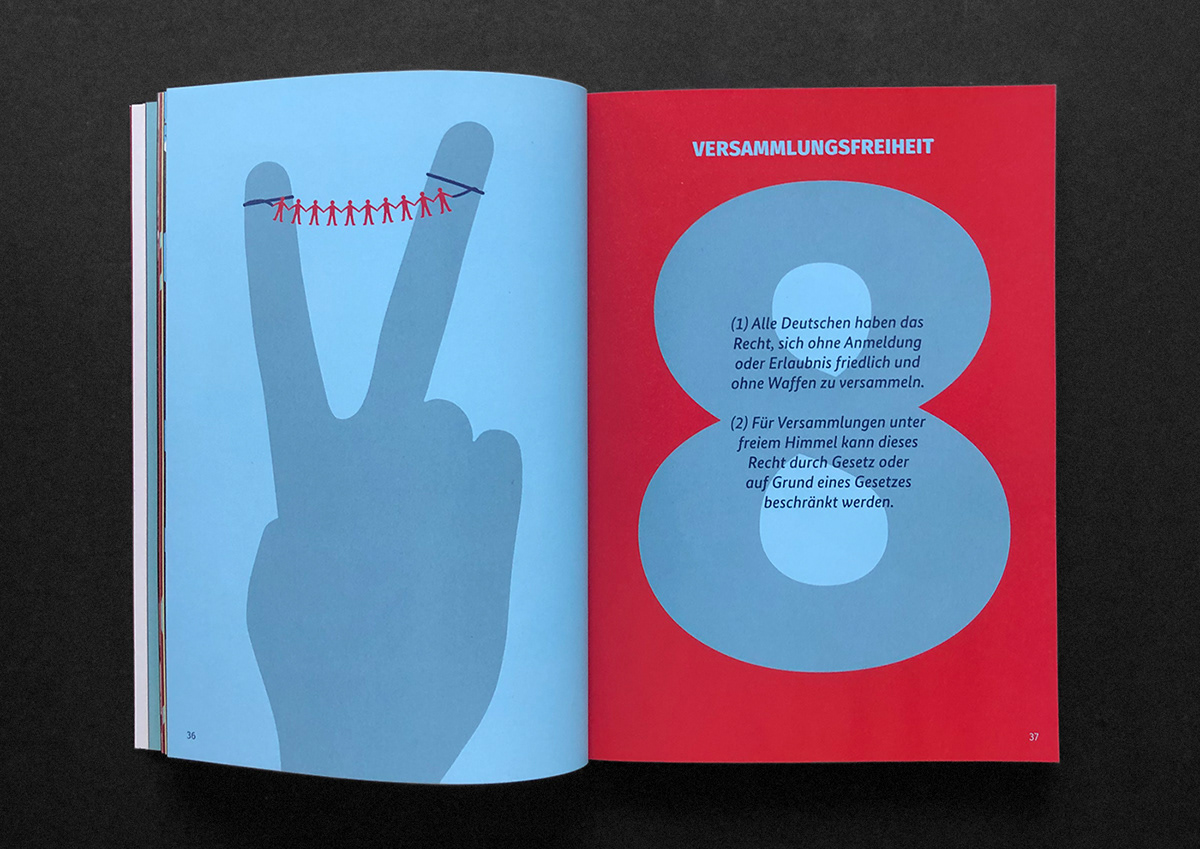
Article 8: Freedom of assembly
(1) All Germans shall have the right to assemble peacefully and unarmed without prior notification or permission.
(2) In the case of outdoor assemblies, this right may be restricted by or pursuant to a law.

Article 10: Privacy of correspondence, posts and telecommunications
(1) The privacy of correspondence, posts and telecommunications shall be inviolable.
(2) Restrictions may be ordered only pursuant to a law. If the restriction serves to protect the free democratic basic order or the existence or security of the Federation or of a Land, the law may provide that the person affected shall not be informed of the restriction and that recourse to the courts shall be replaced by a review of the case by agencies and auxiliary agencies appointed by the legislature.

Article 14: Property – Inheritance – Expropriation
(1) Property and the right of inheritance shall be guaranteed. Their content and limits shall be defined by the laws.
(2) Property entails obligations. Its use shall also serve the public good.
(3) Expropriation shall only be permissible for the public good. It may only be ordered by or pursuant to a law that determines the nature and extent of compensation. Such compensation shall be determined by establishing an equitable balance between the public interest and the interests of those affected. In case of dispute concerning the amount of compensation, recourse may be had to the ordinary courts.

Article 16: Citizenship – Extradition
(1) No German may be deprived of his citizenship. Citizenship may be lost only pursuant to a law, and against the will of the person affected only if he does not become stateless as a result.
(2) No German may be extradited to a foreign country. The law may provide otherwise for extraditions to a member state of the European Union or to an international court, provided that the rule of law is observed.
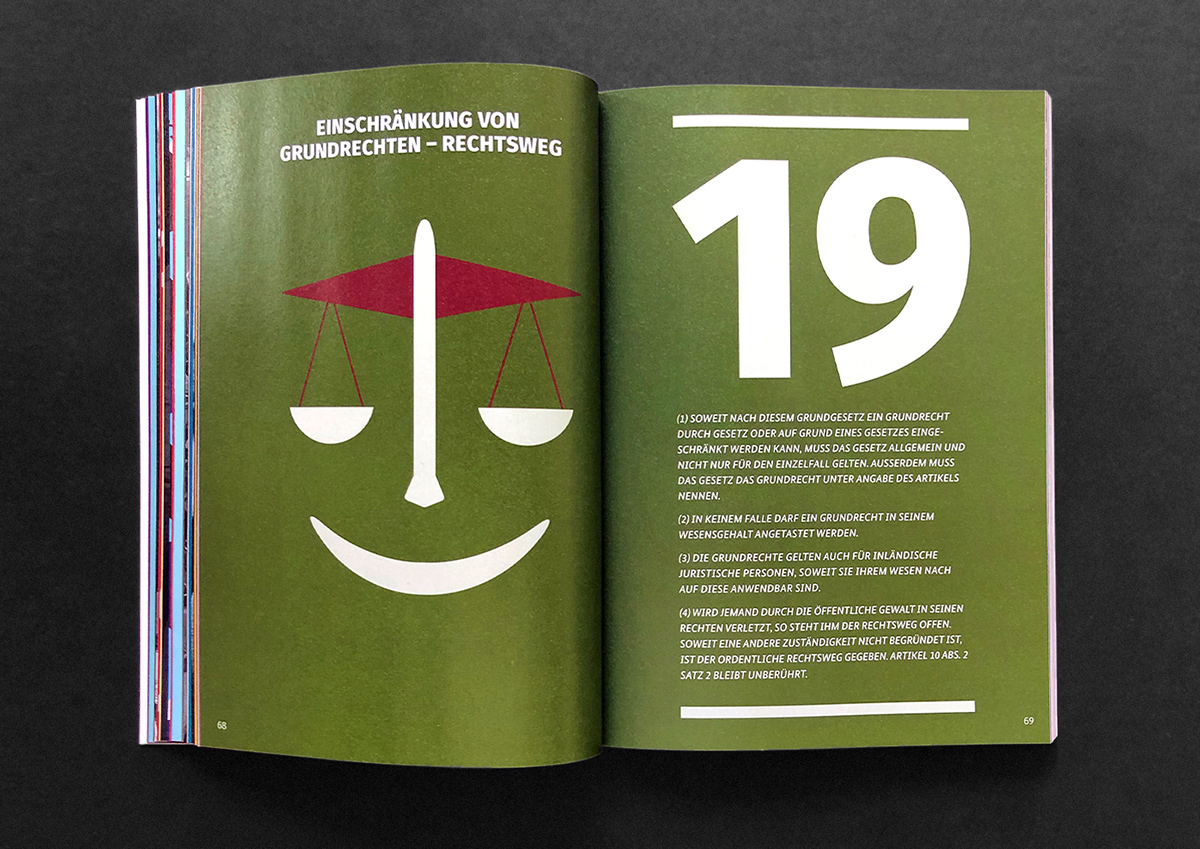
Article 19: Restriction of basic rights – Legal remedies
(1) Insofar as, under this Basic Law, a basic right may be restricted by or pursuant to a law, such law must apply generally and not merely to a single case. In addition, the law must specify the basic right affected and the Article in which it appears.
(2) In no case may the essence of a basic right be affected.
(3) The basic rights shall also apply to domestic artificial persons to the extent that the nature of such rights permits.
(4) Should any person’s rights be violated by public authority, he may have recourse to the courts. If no other jurisdiction has been established, recourse shall be to the ordinary courts. The second sentence of paragraph (2) of Article 10 shall not be affected by this paragraph.
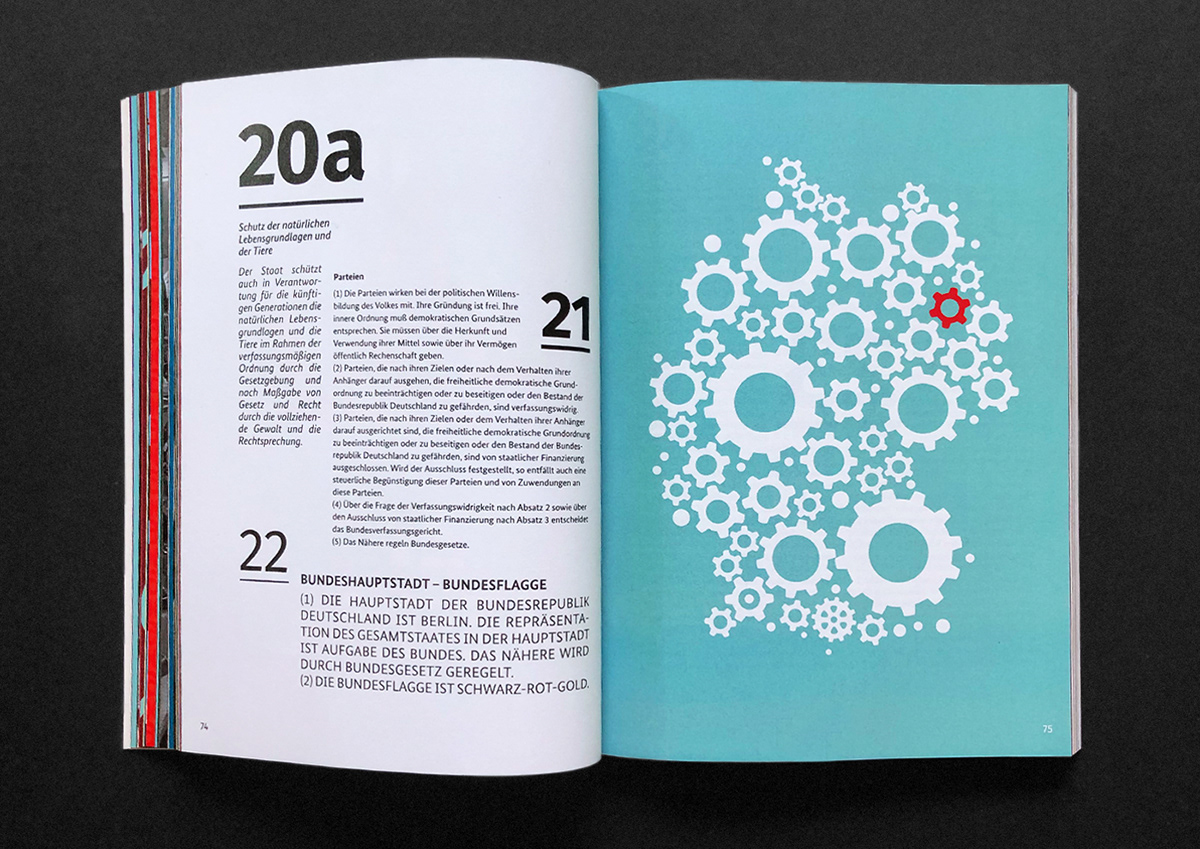
Article 22: Federal capital – Federal flag
(1) Berlin is the capital of the Federal Republic of Germany. The Federation shall be responsible for representing the nation as a whole in the capital. Details shall be regulated by federal law.
(2) The federal flag shall be black, red and gold.

Article 38: Elections
(1) Members of the German Bundestag shall be elected in general, direct, free, equal and secret elections. They shall be representatives of the whole people, not bound by orders or instructions, and responsible only to their conscience.
(2) Any person who has attained the age of eighteen shall be entitled to vote; any person who has attained the age of majority may be elected.
(3) Details shall be regulated by a federal law.

Article 50: The Bundesrat – Functions
The Länder shall participate through the Bundesrat in the legislation and administration of the Federation and in matters concerning the European Union.
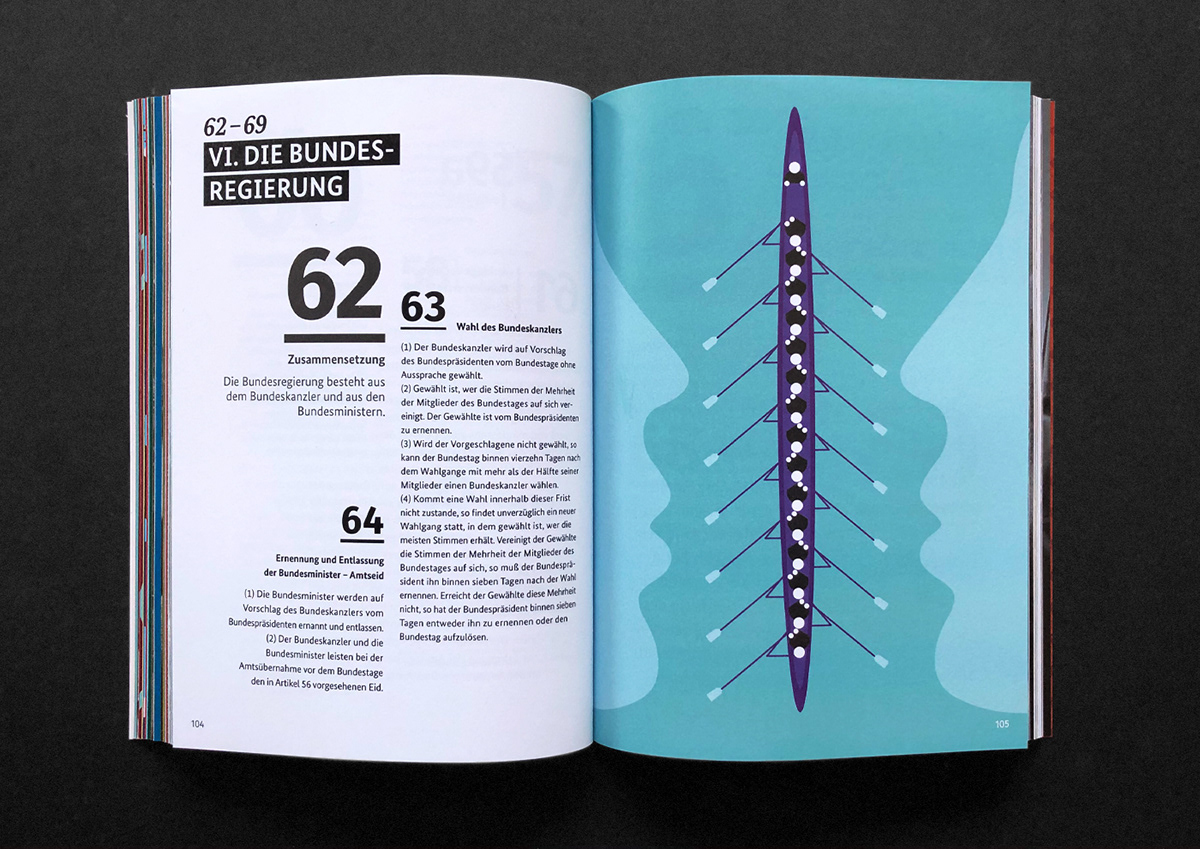
Article 62: The Federal Government
The Federal Government shall consist of the Federal Chancellor and the Federal Ministers.

Article 79: Amendment of the Basic Law
(1) This Basic Law may be amended only by a law expressly amending or supplementing its text. In the case of an international treaty regarding a peace settlement, the preparation of a peace settlement, or the phasing out of an occupation regime, or designed to promote the defence of the Federal Republic, it shall be sufficient, for the purpose of making clear that the provisions of this Basic Law do not preclude the conclusion and entry into force of the treaty, to add language to the Basic Law that merely makes this clarification.
(2) Any such law shall be carried by two thirds of the Members of the Bundestag and two thirds of the votes of the Bundesrat.
(3) Amendments to this Basic Law affecting the division of the Federation into Länder, their participation on principle in the legislative process, or the principles laid down in Articles 1 and 20 shall be inadmissible.

Article 89: Federal highways
(1) The Federation shall be the owner of the former Reich motorways and highways.
(2) The Länder, or such self-governing corporate bodies as are competent under Land law, shall administer the federal motorways and other federal highways used by long-distance traffic on federal commission.
(3) On application of a Land, the Federation may assume the administration of federal motorways and other federal highways used by long-distance traffic insofar as they lie within the territory of that Land.
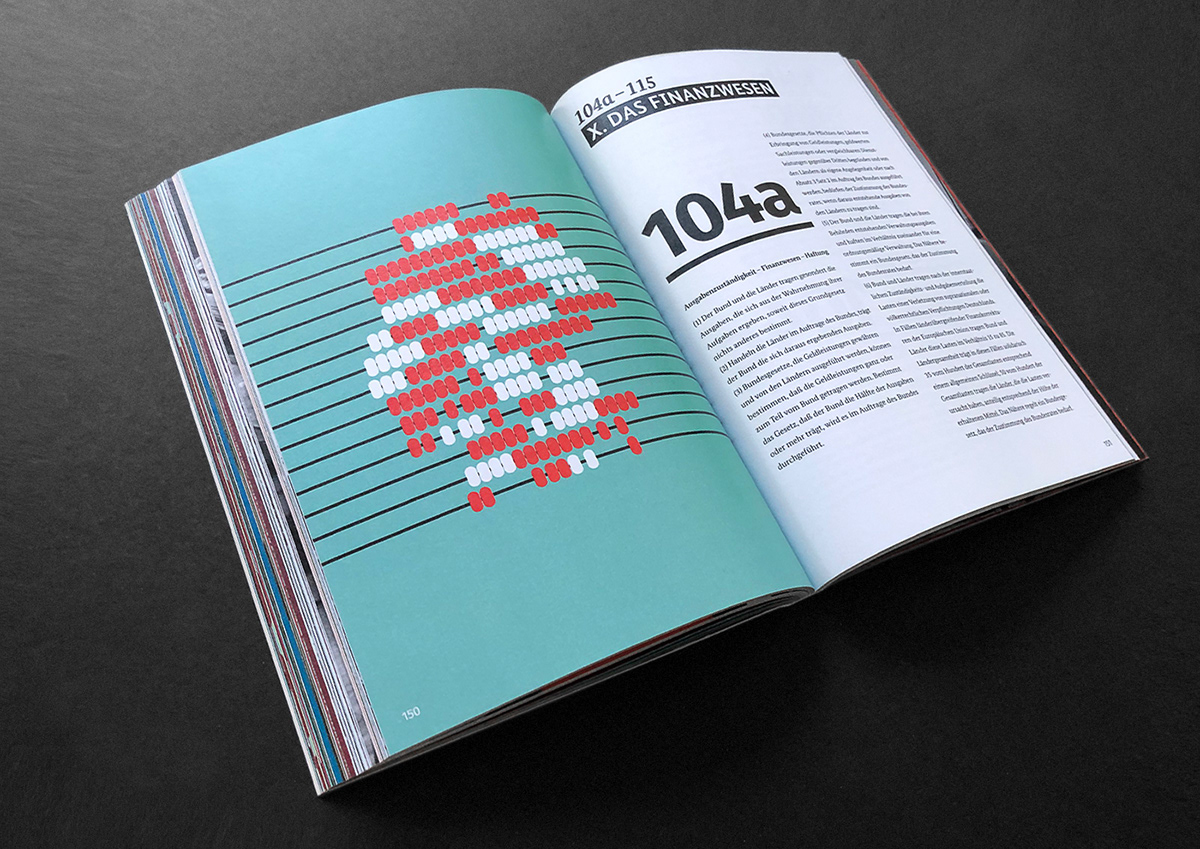
Article 104a: Apportionment of expenditures – Financial system – Liability
(1) The Federation and the Länder shall separately finance the expenditures resulting from the discharge of their respective responsibilities insofar as this Basic Law does not otherwise provide.
(2) Where the Länder act on federal commission, the Federation shall finance the resulting expenditures.
(3) Federal laws providing for money grants to be administered by the Länder may provide that the Federation shall pay for such grants wholly or in part. If any such law provides that the Federation shall finance one half or more of the expenditure, it shall be executed by the Länder on federal commission.
(4) Federal laws that oblige the Länder to provide money grants, benefits in kind or comparable services to third persons and which are executed by the Länder in their own right or according to the second sentence of paragraph (3) on commission of the Federation shall require the consent of the Bundesrat if the expenditure resulting therefrom shall be borne by the Länder.
(5) The Federation and the Länder shall finance the administrative expenditures incurred by their respective authorities and shall be responsible to one another for ensuring proper administration. Details shall be regulated by a federal law requiring the consent of the Bundesrat.
(6) In accord with the internal allocation of competencies and responsibilities, the Federation and the Länder shall bear the costs entailed by a violation of obligations incumbent on Germany under supranational or international law. In cases of financial corrections by the European Union with effect transcending one specific Land, the Federation and the Länder shall bear such costs at a ratio of 15 to 85. In such cases, the Länder as a whole shall be responsible in solidarity for 35 per cent of the total burden according to a general formula; 50 per cent of the total burden shall be borne by those Länder which have caused the encumbrance, adjusted to the size of the amount of the financial means received. Details shall be regulated by a federal law requiring the consent of the Bundesrat.

Article 110: Federal budget
(1) All revenues and expenditures of the Federation shall be included in the budget; in the case of federal enterprises and special trusts, only payments to or remittances from them need be included. The budget shall be balanced with respect to revenues and expenditures.
(2) The budget for one or more fiscal years shall be set forth in a law enacted before the beginning of the first year and making separate provision for each year. The law may provide that various parts of the budget apply to different periods of time, divided by fiscal years.
(3) Bills to comply with the first sentence of paragraph (2) of this Article as well as bills to amend the Budget Law or the budget itself shall be submitted simultaneously to the Bundesrat and to the Bundestag; the Bundesrat shall be entitled to comment on such bills within six weeks or, in the case of amending bills, within three weeks.
(4) The Budget Law may contain only such provisions as relate to federal revenues and expenditures and to the period for which it is enacted. The Budget Law may specify that its provisions shall expire only upon promulgation of the next Budget Law or, in the event of an authorisation pursuant to Article 115, at a later date.



















